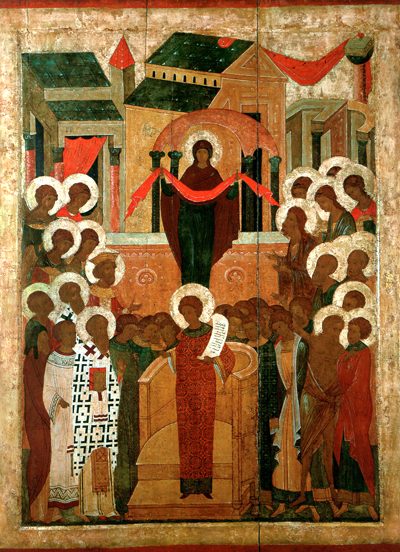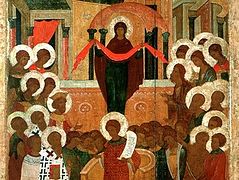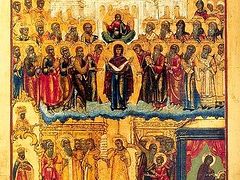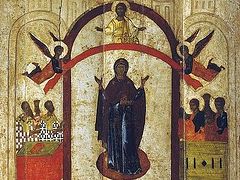|
Kontakion Today the Virgin is standing before us in the Churchpraying for us with the choirs of Saints. Angels worship with Hierarchs, Apostles rejoice with Prophets, for the Mother of God intercedes with the Eternal God for us. |
The Church has always glorified the Most Holy Mother of God as the Protectress and Defender of the Christian people, entreating, by her intercession, God's loving-kindness towards us sinners. The Mother of God's aid has been clearly shown times without number, both to individuals and to peoples, both in peace and in war, both in monastic deserts and in crowded cities. The event that the Church commemorates and celebrates on October 1 [October 14, Civil Calendar] proves this constant protection of the Christian people by the Mother of God. On October 1st, 911, in the time of the Emperor Leo the Wise (or the Philosopher), there was an all-night vigil at the Blachemae church of the Mother of God in Constantinople. The church was crowded. St. Andrew the Fool for Christ was standing at the back of the church with his disciple Epiphanius. At four o'clock in the morning, the most holy Mother of God appeared above the people with a veil spread over her outstretched hands, as though to protect them with this covering. She was clad in gold-encrusted purple and shone with an unspeakable radiance, surrounded by apostles, saints, martyrs and virgins. Seeing this vision, St. Andrew gestured towards it and asked Epiphanius: 'Do you see how the Queen and Lady of all is praying for the whole world?' Epiphanius replied: 'Yes, Father; I see it and stand in dread.' As a result, this commemoration was instituted to remind us both of this event and of the Mother of God's constant protection whenever we prayerfully seek that protection, that shelter, in distress.
From The Prologue From Ochrid by Bishop
Nikolai Velimirovich
1985 Lazarica Press, Birmingham, UK





The Primary Chronicle of Saint Nestor reflects that the protective intercession of the Mother of God was needed because an attack of a large pagan Russian fleet under the leadership of Askole and Dir. The feast celebrates the divine destruction of the fleet which threatened Constantinople itself, sometime in the years 864-867 or according to the Russian historian Vasiliev, on June 18, 860. Ironically, this Feast is considered important by the Slavic